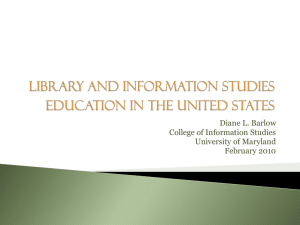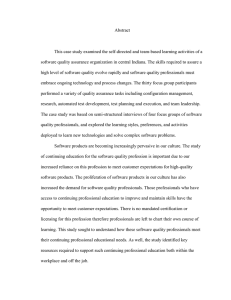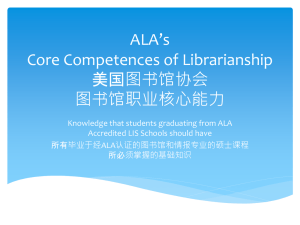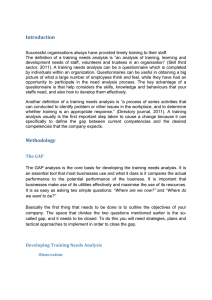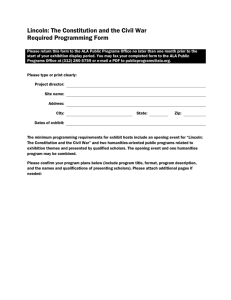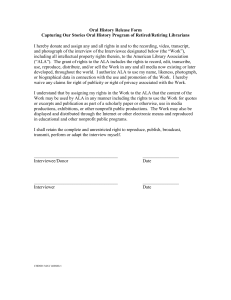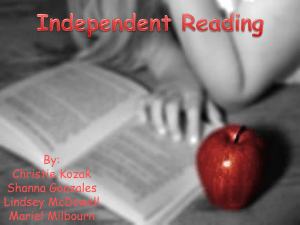Professional Education
advertisement
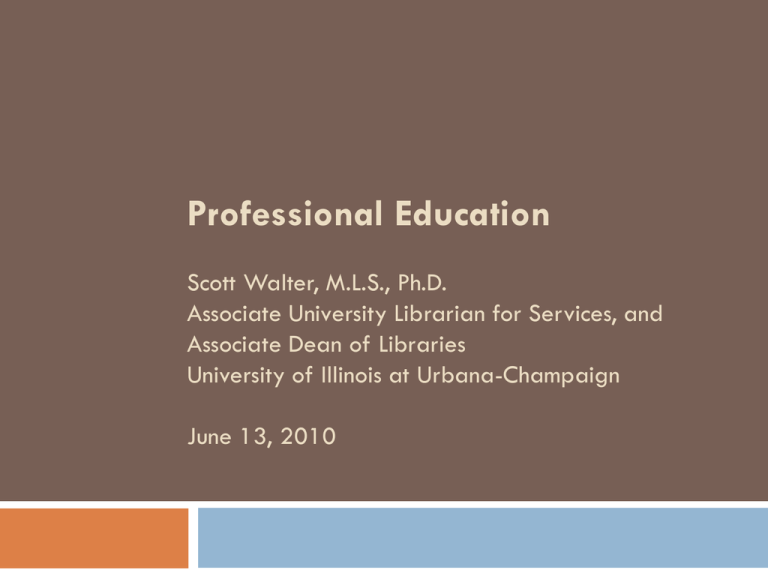
Professional Education Scott Walter, M.L.S., Ph.D. Associate University Librarian for Services, and Associate Dean of Libraries University of Illinois at Urbana-Champaign June 13, 2010 What is a Profession? “A profession is a disciplined group of individuals who adhere to ethical standards and hold themselves out as, and are accepted by the public as possessing special knowledge and skills in a widely recognised body of learning derived from research, education and training at a high level, and who are prepared to apply this knowledge and exercise these skills in the interest of others.” Source: Professions Australia. (1997). Definitions of a profession. Retrieved from http://www.professions.com.au/definitionprofession.html What is Professional Education? “The distinguishing features of modern professional education in medicine have been, first, its assimilation of the spirit of university research and, second, its powerful linkages with teaching hospitals.” Source: Neave, G. R., & Clark, B. R. (Eds.). (1992). The encyclopedia of higher education. Oxford: Pergamon Press. Image Credit: Graduate School of Library and Information Science. University of Illinois at UrbanaChampaign. (n.d.). Apprentice spotlight: Alison Greenlee. Retrieved from http://www.lis.illinois.edu/academics/pro grams/mbms/apprenticespotlight Linkages in LIS Education: Accreditation ALA accredits 62 programs at 57 institutions in the U.S., Canada, and Puerto Rico Accreditation is based on program review of the Standards for Accreditation of Master’s Programs in Library & Information Science Source: American Library Association. (2010). Office for Accreditation. Retrieved from http://www.ala.org/ala/aboutala/offices/a ccreditation/index.cfm Linkages in LIS Education: Accreditation “Accreditation is a voluntary system of evaluation of higher education institutions and programs. It is a collegial process based on selfevaluation and peer-assessment for improvement of academic quality and public accountability. Accreditation assures that higher education institutions and their units, schools, or programs meet appropriate standards of quality and integrity.” Source: American Library Association. (2010). Office for Accreditation. Retrieved from http://www.ala.org/ala/aboutala/offices/a ccreditation/index.cfm The Professional Education Pyramid Professional education programs must recognize different needs at different stages of one’s career: Novice Advanced Beginner Competent Practitioner Proficient Practitioner Expert Source: Queeney, D. S. (2000). Continuing professional education. In A. L. Wilson & E. R. Hayes (Eds.), Handbook of adult and continuing education (pp. 375-391). San Francisco: Jossey-Bass. Core Competencies of the Profession “The Core Competences of Librarianship define the knowledge to be possessed by all persons graduating from ALA-accredited master’s programs in library and information studies.” Source: American Library Association. (2010). Core competences. Retrieved from http://www.ala.org/ala/educationcaree rs/careers/corecomp/corecompetenc es/index.cfm Image Credit: DEFT UK. (2006). Training and development. Retrieved from http://deftuk.com/Services/Train develop.html Core Competencies of the Profession Foundations of the Profession Information Resources Organization of Recorded Knowledge and Information Technological Knowledge and Skills Reference and User Services Research http://www.ala.org/ Continuing Education and Lifelong Learning Administration and Management http://www.alise.org/ Core Competencies of the Profession articulate the ethics, values and foundational principles of LIS professionals design, query and evaluate information retrieval systems demonstrate proficiency in the use of current information and communication technologies use service concepts, principles and techniques that facilitate information access describe the fundamental concepts of information-seeking behaviors design training programs understand the nature of research evaluate programs and services Source: School of Library and Information Science. San Jose State University. (n.d.). Statement of core competencies. Retrieved from http://slisweb.sjsu.edu/slis/comp etencies.htm Linkages in LIS Education: Core Competencies American Association of Law Libraries American Library Association Art Libraries Society of North America Medical Library Association Music Library Association Special Libraries Association Image Credit: Medical Library Association. (2007). Competencies for lifelong learning and professional success: The educational policy state of the Medical Library Association. Retrieved from http://www.mlanet.org/education/policy/ Core Competencies in Action: The University of Nebraska Libraries “Core competencies are the skills, knowledge and personal attributes that contribute to an individual’s success in a particular position . . . . They are the knowledge and skills that make the organization a success and help the organization change to meet a changing environment.” Source: Giesecke, J., & McNeil, B. (1999). Core competencies and the learning organization. Library Administration & Management, 13 (3). Retrieved from http://digitalcommons.unl.edu/librarys cience/60 What is Continuing Professional Education? “Continuing professional education refers to the education of professional practitioners, regardless of their practice setting, that follows their preparatory curriculum and extends their learning, or assimilation of information and ideas that can contribute to the quality of their day-to-day performance, throughout their careers.” Source: Queeney, D. S. (1996). Continuing professional education. In R. L. Craig (Ed.), The ASTD training and development handbook: A guide to human resource development (4th ed.) (pp. 698-724). New York: McGraw-Hill. Continuing Professional Education and LIS Education “GSLIS is committed to expanding our focus of continuous learning and development by creating and providing the library and information professional community with a variety of continuing professional development opportunities in many areas of library and information science, services, and operations.” Source: Graduate School of Library & Information Science. University of Illinois at Urbana-Champaign. (n.d.). Continuing professional development. Retrieved from http://www.lis.illinois.edu/academics/progr ams/cpd Continuing Professional Education and Professional Associations “Continuous learning efforts focus both on the library profession in keeping with ALA's mission to deliver the highest quality library and information services to all people. ALA has a unique role to play in assessing the continuing education needs of its members and of those in the profession; coordinating programs to meet those needs; communicating their availability; and delivering training where appropriate.” Source: American Library Association. (2007). What ALA does: Offers the best in CE. Retrieved from http://www.ala.org/ala/membership/whataladoes/offers ce/index.cfm http://alalearning.org/ http://www.arl.org/sc/instit ute/index.shtml Continuing Professional Education and Libraries “Instructor College is a specially focused staff development initiative of the University Library. Its goal is to strengthen the instructional skills of Library staff. By giving excellent instruction, the Library seeks to help users realize the full value of the resources it provides.” Source: MLibrary. University of Michigan. (2010). Instructor College. Retrieved from http://www.lib.umich.edu/instructor-college Linkages in Continuing Professional Education “GSLIS, in partnership with the Rare Book and Manuscript Library and the Soybean Press of the University of Illinois at UrbanaChampaign, has developed the Midwest Book and Manuscript Studies (MBMS) program to offer a series of courses and workshops focused on special collections and the book arts.” Source: Graduate School of Library & Information Science. University of Illinois at UrbanaChampaign. (n.d.). Midwest Book and Manuscript Studies. Retrieved from http://www.lis.illinois.edu/academi cs/programs/mbms Linkages and Lifelong Learning “No educational institution teaches just through its courses, workshops, and institutes; no corporation teaches just through its in-service education programs; and no voluntary organization teaches just through its meetings and study groups. They all teach by everything they do . . .” Source: Knowles, M. S., Holton, E. F., III, & Swanson, R. A. (2005). The adult learner: The definitive classic in adult education and human resource development (6th ed.). Boston: Elsevier. Image Credit: Quality Assurance Agency for Higher Education. (2007). Scottish benchmark statements: The standard for childhood practice 2007. Retrieved from http://www.qaa.ac.uk/academicinfrastruct ure/benchmark/scottish/earlyYears.asp Questions Contact Scott Walter Associate University Librarian for Services, and Associate Dean of Libraries University of Illinois at Urbana-Champaign swalter@illinois.edu https://netfiles.uiuc.edu/swalter/www/index.html
